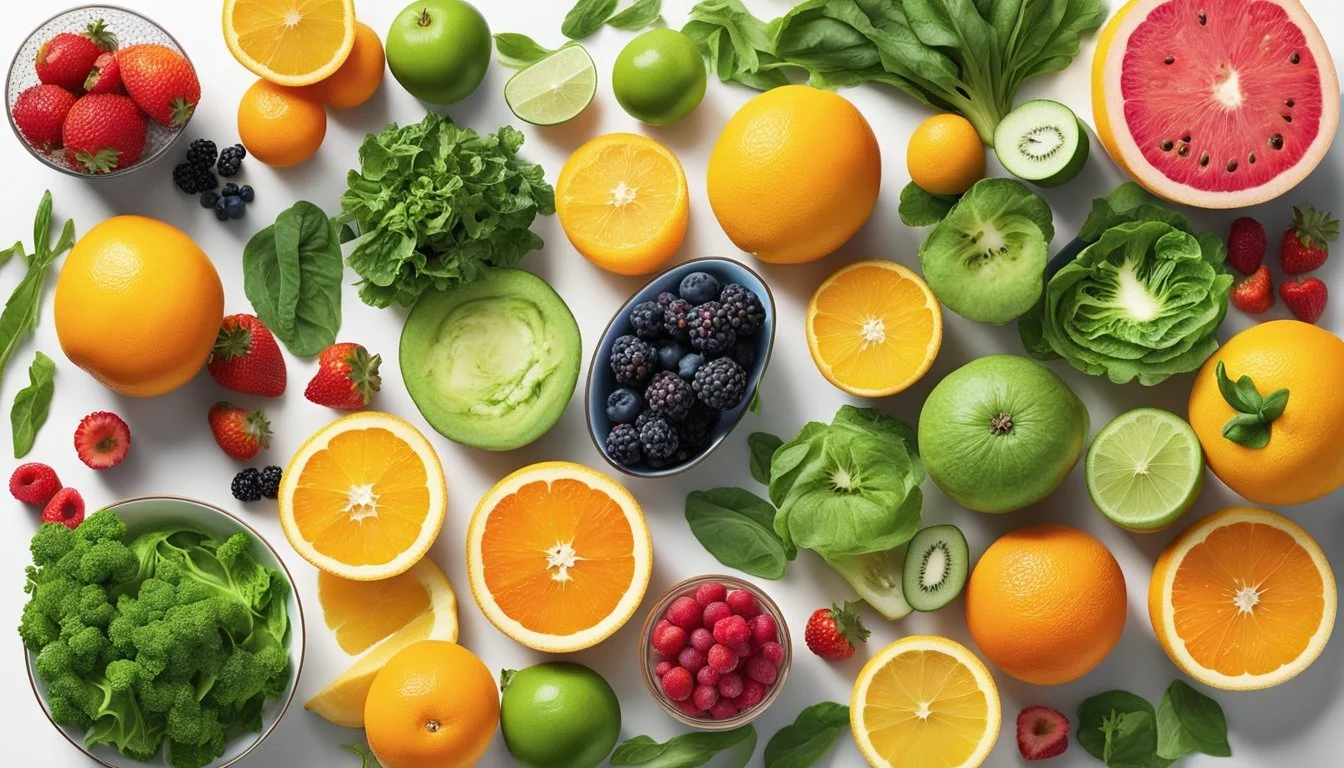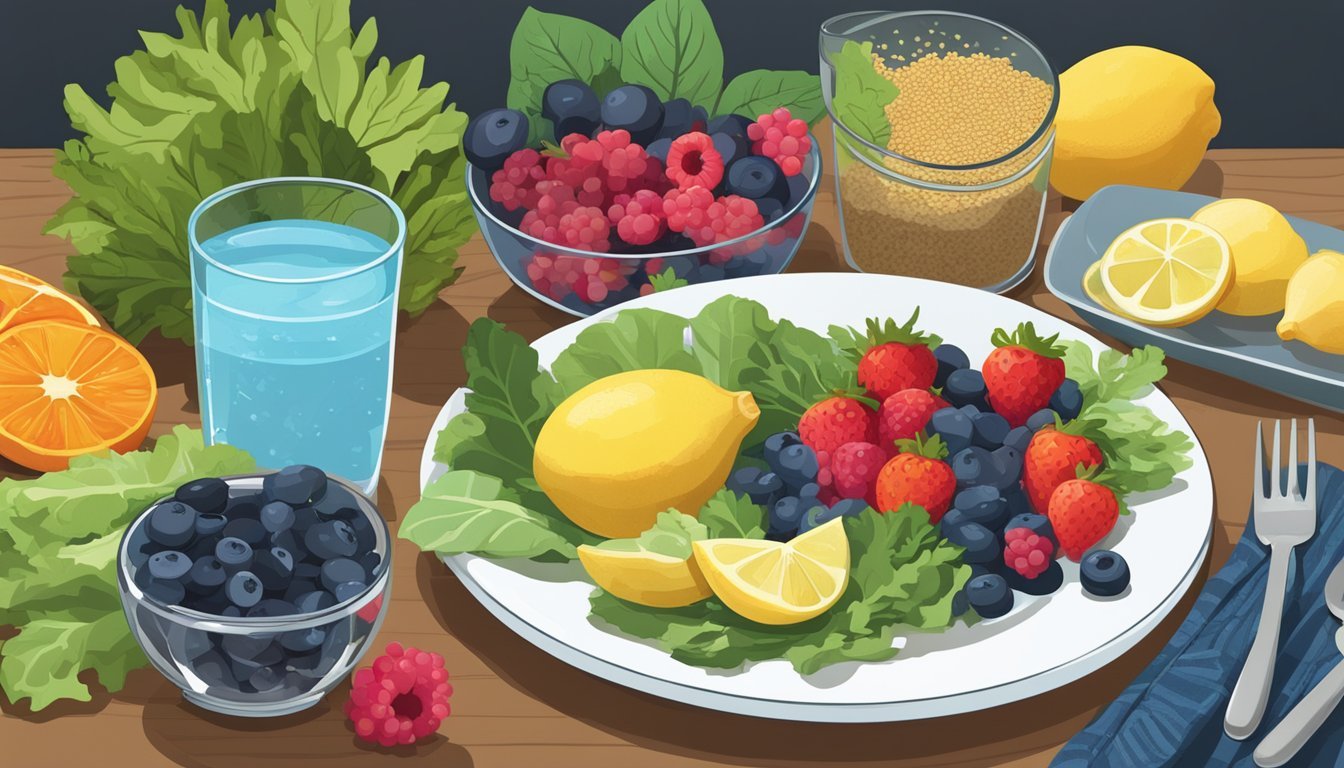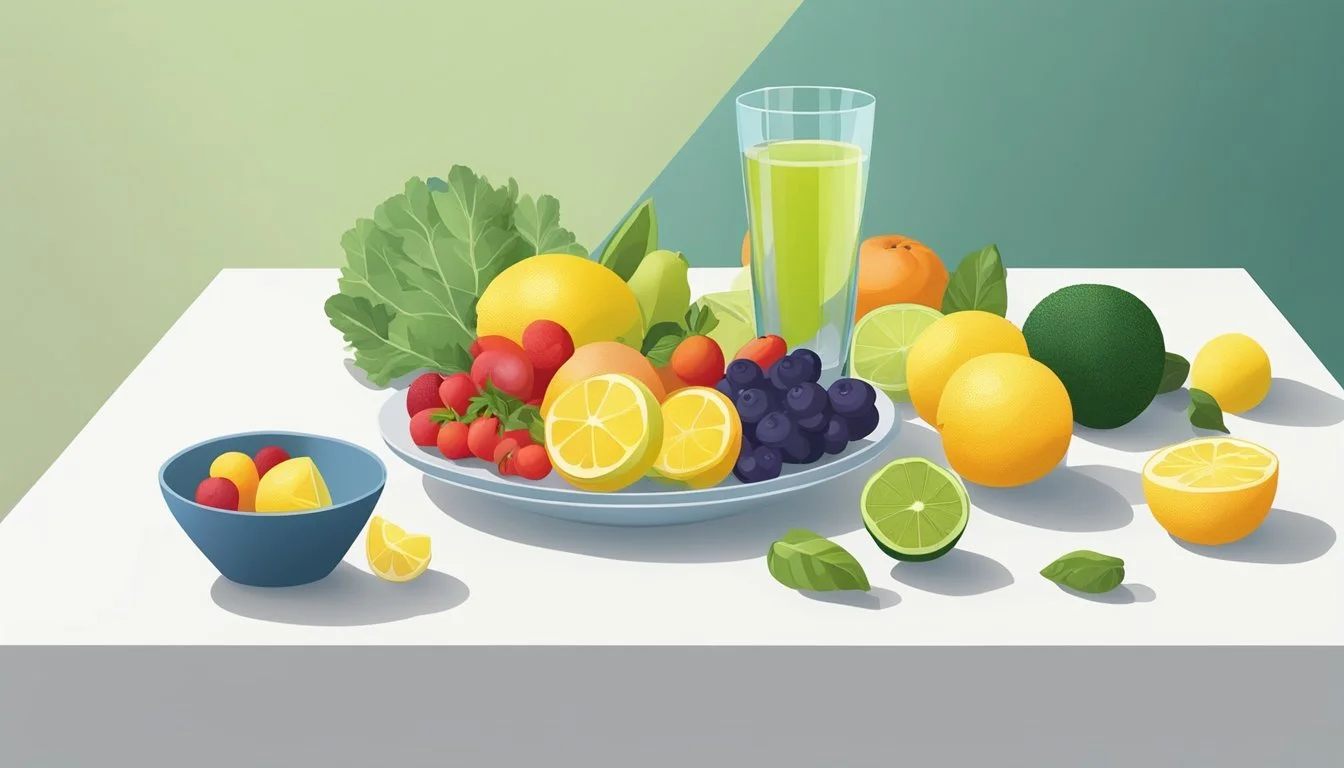Best Foods for a Post-Holiday Detox and Reset
Your Guide to Cleansing Nutrition
The period following the holiday season is a prime time for individuals to seek a detox and reset, aiming to alleviate the aftereffects of festive indulgence. With an abundance of rich foods and celebratory drinks often leaving one feeling sluggish and bloated, a targeted approach to nutrition can assist in rejuvenating the body. Foods that support the body's natural detoxification processes become particularly significant during this time.
Choosing the right foods for a post-holiday detox can expedite the body's return to optimal functioning. Incorporating a diet rich in protein, fiber, and healthy fats can infuse energy and promote satiety, reducing the propensity for further indulgence. High-fiber foods, in particular, are instrumental in normalizing digestive functions and can help in reaching a recommended intake of 25 to 30 grams per day.
Hydration is another pivotal aspect of the post-holiday detox routine. Opting for water over caffeinated or sugary drinks is essential to rehydrate the body and support the elimination of toxins. This reset is not solely about the physical, as setting clear, achievable health goals can provide a roadmap for sustaining well-being beyond the initial detox period, ensuring long-term investment in one's health.
Understanding Detoxification
Detoxification is a natural metabolic process where the body's systems, particularly the liver, work to eliminate toxins. This section explores the scientific basis of detox processes and debunks common myths.
The Science of Detox
Detoxification involves multiple systems in the body, primarily the liver, which is equipped to filter out harmful substances. The liver processes these toxins for excretion, converting fat-soluble toxins into water-soluble forms that can be easily eliminated through urine, sweat, or feces. A healthy detox plan supports this natural pathway without overburdening the system.
The detox diet usually includes foods that assist this natural detoxification process by providing necessary nutrients and antioxidants.
Foods rich in compounds like glutathione, found in vegetables like broccoli and Brussels sprouts, are known to enhance the liver's capacity to detoxify.
Common Myths About Detoxing
Detoxing is often surrounded by misinformation which can overshadow its true purpose.
Myth 1: Detoxes can flush out all impurities instantaneously.
Truth: The body is constantly detoxifying; short-term detox diets cannot clear all toxins immediately.
Myth 2: Special products or supplements are necessary for detoxification.
Truth: A balanced diet consisting of whole foods is typically sufficient for supporting the body's natural detox mechanisms.
Detox plans should not be seen as a one-time solution but as a supportive element for overall healthy living practices.
Post-Holiday Health Reset
The holiday indulgences often lead to a felt need for a health reset, primarily focusing on detoxification and a return to routine. A successful reset incorporates setting achievable health goals and re-establishing a robust day-to-day routine.
Setting Realistic Goals
Post-holiday goals should be measurable and attainable to prevent discouragement. For instance:
Hydration: Aim to drink at least 8 glasses of water daily to support kidney and liver function.
Diet Moderation: Reduce intake of processed sugars gradually, perhaps cutting usual consumption by half initially.
They may also resolve to limit alcohol consumption to give their body a chance to recover, or incorporate more fiber-rich foods into their meals.
Re-establishing a Routine
Establishing a routine is crucial for long-term success. Below are steps one might incorporate:
Wake Up Time: Set a consistent wake-up time to regulate the body's internal clock.
Meal Timing: Ensure they have regular meal times to aid digestion.
The key is to reintroduce structure in one's lifestyle, which includes prioritizing sleep, balanced meals, and regular physical activity.
Optimizing Your Diet for Detox
Post-holiday, the body can benefit from a dietary reset that focuses on nutrient-dense whole foods and ample hydration to support natural detoxification processes.
Foods to Favor
Whole Foods: An emphasis on whole foods, particularly vegetables and fruits, can help provide the body with vital vitamins, minerals, and antioxidants. For optimal detox, one should incorporate a variety of colorful produce.
Vegetables: Such as kale, spinach, and broccoli, are high in fiber and essential nutrients.
Fruits: Berries, apples, and citrus fruits offer important vitamins and are high in fiber.
Lean Proteins: Lean sources of protein, including chicken, fish, and plant-based alternatives like lentils, are crucial for rebuilding tissues and supporting liver function.
Fish: Salmon, mackerel, and sardines for their omega-3 fatty acids.
Plant-based meals: Incorporate tofu, tempeh, and chickpeas for their protein content and fiber.
Hydration: Proper hydration is a cornerstone of any detox plan. Adequate water intake helps flush toxins and supports kidney function.
Water: Aim for 8-10 glasses of water per day.
Herbal teas: They can also contribute to overall fluid intake.
Fiber: A high-fiber diet aids in digestion and can help remove waste products from the body more efficiently.
Sources: Include beans, legumes, whole grains, and seeds in the diet.
Foods to Avoid
To optimize the body's natural detoxification, certain foods that may burden the system should be limited or avoided.
Processed Foods: High in sodium and preservatives, these can hinder the body's healing processes.
Sugar: Can cause spikes in blood glucose levels and may lead to energy crashes. Minimize intake of sugary snacks and beverages.
Fat: Specifically trans fats and high amounts of saturated fats found in fried and fast foods can be inflammatory.
Alcohol: It taxes the liver and can disrupt sleep and hydration levels, impeding the body's ability to detox.
By making mindful choices to favor nutritious foods and avoid those that are less beneficial, individuals can support their body's health and detoxification process effectively.
Hydration and its Importance
Maintaining adequate hydration levels is crucial following a holiday season marked by excesses. It helps the body reset and supports essential detoxification processes.
Assessing Your Water Needs
An individual's water needs can vary based on factors such as age, weight, climate, and activity level. A general guideline is to drink at least eight 8-ounce glasses of water per day, known as the "8x8 rule." For a more personalized assessment, consider the color of your urine — a light, straw-like color typically indicates proper hydration, while darker shades may signal a need for increased water intake.
Benefits of Staying Hydrated
Staying well-hydrated offers several benefits:
Digestive Health: Water assists with the digestion of food and helps prevent constipation by moving food through the intestinal tract.
Toxin Removal: Adequate hydration aids the kidneys in filtering out waste products and toxins from the blood.
Cellular Health: Every cell in the body needs water to function properly. Adequate hydration ensures that nutrients are delivered to cells, and waste products are removed effectively.
Energy and Concentration: Dehydration can lead to fatigue and decreased alertness. Ensuring that one is hydrated helps maintain energy levels and improve cognitive function.
Developing a routine that includes consistent water intake throughout the day can help ensure one stays adequately hydrated. Including foods with high water content, such as fruits and vegetables, can contribute to overall hydration.
Effective Exercise for Detox
The key to a successful post-holiday detox involves not only dietary adjustments but also incorporating a tailored exercise regimen for expelling toxins and enhancing energy.
Choosing the Right Physical Activities
Cardiovascular Exercises: They are crucial for increasing heart rate and improving blood circulation, which helps in efficiently removing toxins from the body. Incorporating 30 minutes of moderate-intensity exercises like brisk walking, jogging, or swimming can significantly aid in the detoxification process.
High-Intensity Interval Training (HIIT): Short bursts of intense effort followed by rest periods elevate metabolism and energy consumption, resulting in effective toxin elimination. A HIIT session can be done at the gym or at home and typically lasts for about 20-30 minutes.
Yoga: It combines physical postures, breathing exercises, and meditation to not only promote physical flexibility and strength but also facilitate detoxification. Specific poses that twist and compress organs can help in wringing out toxins, while deep breathing enhances oxygenation and cleansing.
Strength Training: Lifting weights or bodyweight exercises helps build muscle, which in turn boosts basal metabolic rate. This heightened metabolism aids in detox as the body becomes more effective at processing and eliminating waste.
Rest and Recovery
Adequate Sleep: Sleep is when the body repairs itself. Ensuring 7-9 hours of quality sleep per night can greatly support detoxification, as many of the body’s cleansing processes happen during deep sleep.
Active Recovery: Light physical activity on rest days, such as stretching or walking, can keep the blood flowing gently, promoting the removal of toxins without overtaxing the body.
Hydration: Drinking enough water is essential for flushing out toxins. The individual should stay properly hydrated especially after workouts, to replenish fluids lost through sweat.
Rest Days: Integrating rest days into an exercise routine is essential for recovery and avoiding overtraining, which can be counterproductive to a detox as it might lead to fatigue and reduced immune function.
Mental and Emotional Wellbeing
Post-holiday detox isn't just about physical nourishment; it's equally crucial to address mental and emotional health. A holistic approach can enhance overall wellness and mitigate feelings of guilt or shame that may follow holiday indulgence.
Mindfulness and Stress Management
Mindfulness is a powerful tool in managing stress and restoring mental balance. It involves being present in the moment and observing one’s thoughts and feelings without judgment.
Techniques like deep breathing, meditation, and guided imagery can contribute to stress reduction and improved sleep quality.
Regular mindfulness practice can also help one cope with the post-holiday blues by fostering a sense of peace and acceptance.
Coping with Post-Holiday Blues
The period after holidays can often lead to feelings of sadness or post-holiday blues. It's important for an individual’s emotional detox to include strategies for coping with these feelings.
Staying connected with friends and family can offer emotional support.
Establishing a routine and setting achievable goals can provide a sense of purpose and direction.
Engaging in activities that promote wellness, such as yoga or taking a nature walk, can also be beneficial. It’s essential for one to acknowledge their emotions and seek professional help if feelings of guilt, shame, or prolonged sadness persist.
Supporting Digestive Health
The post-holiday period often requires a reset to support digestive health, focusing on gut-friendly probiotics and a sufficient intake of digestive enzymes and fiber. These measures can help alleviate bloating and improve overall gut function.
Probiotics and Gut Health
Probiotics are beneficial bacteria that play an essential role in maintaining a healthy digestive system. They help balance the gut microbiota, which can be disrupted by indulgent holiday eating. Regular consumption of probiotics can help reduce bloating and support the body's natural digestion processes. Foods rich in probiotics include:
Yogurt: Select varieties with live active cultures.
Kefir: A fermented milk drink that's rich in lactobacilli.
Sauerkraut: Fermented cabbage containing a variety of probiotic strains.
Kimchi: A spicy fermented vegetable dish popular in Korean cuisine.
Miso: A Japanese seasoning produced by fermenting soybeans with salt and koji.
In addition, a variety of probiotic supplements are available, but one should opt for those with documented strains and efficacy.
Digestive Enzymes and Fiber Intake
Digestive enzymes assist in breaking down food components, making it easier for the body to absorb nutrients. Enzyme production may decrease with overconsumption of processed foods. To support enzyme function and enhance digestion, one should consider foods high in natural enzymes, such as pineapples and papayas.
Fiber is crucial for digestive health, aiding in regular bowel movements and helping to prevent constipation. A daily fiber intake of 25-30 grams is recommended. Sources of high-quality fiber include:
Legumes: Beans, lentils, and chickpeas are excellent sources of fiber.
Whole Grains: Oats, quinoa, and brown rice provide substantial amounts of fiber.
Vegetables and Fruits: Particularly those with edible peels or seeds.
Nuts and Seeds: Almonds, chia seeds, and flaxseeds are fiber-rich options.
By incorporating these foods into one's diet, the digestive system can efficiently manage the excesses of holiday feasting, ensuring one feels less bloated and promotes a healthier gut.
Detoxifying with Superfoods
The recuperation from holiday indulgence can greatly benefit from incorporating superfoods known for their detoxifying properties. These foods are packed with antioxidants and anti-inflammatory agents, as well as key vitamins and minerals.
Antioxidants and Anti-inflammatory Foods
Leafy Greens: Rich in antioxidants, leafy greens like spinach, kale, and Swiss chard are vital in combating oxidative stress and reducing inflammation. They contain compounds that support the body's natural detoxification processes.
Cruciferous Vegetables: A subset of leafy greens, these vegetables—including broccoli, cabbage, and Brussels sprouts—are not only antioxidants but also help support liver function, a crucial organ for detoxification.
Key Vitamins and Minerals
Iron: Necessary for transporting oxygen in the blood, iron is abundant in certain detoxifying foods. Foods like lentils and spinach provide iron while also offering other detoxification support.
Vitamins A, C, and E: These vitamins are powerful antioxidants found in many detoxifying foods. Vitamin C, for instance, is prominent in lemons, which help stimulate digestion and enhance hydration.
Minerals: Essential minerals such as magnesium and calcium are found in superfoods like nuts and seeds. These minerals contribute to proper function of the detoxification pathways in the body.
Creating Long-Term Healthy Habits
Post-holiday detox should be more than a short-term fix; it lays the groundwork for long-term healthy habits that are sustainable and contribute to a balanced lifestyle.
Sustainable Eating Practices
To establish sustainable eating practices, individuals should focus on incorporating a variety of nutrient-dense foods that support overall health. A balanced diet is key, consisting of:
Whole Foods: Emphasize fresh fruits, vegetables, whole grains, lean proteins, and healthy fats.
Fiber Intake: Aim for 25 to 30 grams of fiber daily to aid digestion and maintain satiety.
Hydration: Drink sufficient water to support metabolic processes and toxin elimination.
Moderation is central to sustainability, ensuring that one can maintain these habits without feeling deprived.
Building a Balanced Lifestyle
A balanced lifestyle encompasses more than just nutrition; it includes physical activity and mental well-being. To build a balanced lifestyle:
Routine Exercise: Incorporate activities that are enjoyable and can be maintained regularly, whether it's walking, swimming, yoga, or strength training.
Mindfulness: Practice mindfulness or meditation to reduce stress and improve mental clarity, supporting overall well-being.
Every individual should tailor their habits to fit personal needs and preferences, ensuring they are realistic and can be adhered to in the long run.






